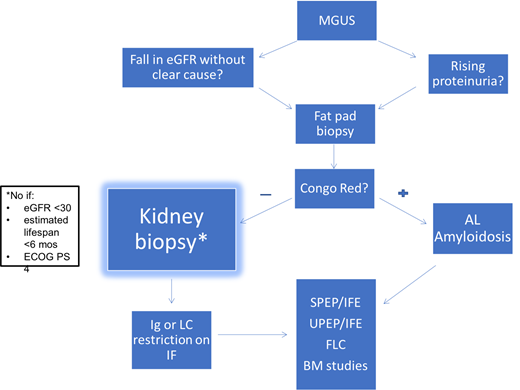Background:Monoclonal gammopathy of renal significance (MGRS) describes a subtype of patients with monoclonal gammopathy of unknown significance (MGUS) who have kidney disease due to immunoglobulin deposition. Early identification of MGRS and treatment with chemotherapy can prevent progression to kidney failure. There is limited data on the characteristics of populations with concomitant MGUS and chronic kidney disease (CKD), and on the prevalence of diagnosed MGRS in this population in the real world. Methods: Through retrospective chart review, we identified 246 patients with ICD-9 or -10 codes denoting both MGUS and chronic kidney disease (CKD) between the years of 2000 and 2017. Patients with related overt malignancies such as multiple myeloma, Waldenstrom's macroglobulinemia, and amyloidosis at onset were excluded, leaving 144 evaluable patients. Results:The median age was 78, and females made up 41.0% of the population. At time of MGUS diagnosis, the median eGFR was 48 mL/min/1.73 m2, and in patients with a quantifiable gammopathy, the median M-protein was 0.54 g/dL. A total of 53/144 (36.8%) patients had a bone marrow biopsy and 19/144 (13.2%) underwent kidney biopsy. MGRS was considered as a cause of kidney dysfunction in 20/144 patients (13.9%), but only 6 were further worked up by kidney biopsy. In 3/144 (2.1%) patients, MGRS was confirmed by kidney biopsy. Ten of (6.9%) the total population and 1 (5%) of the patients with suspected or confirmed MGRS (n=20) developed malignant transformation. Conclusion: MGRS should be considered in the differential diagnosis of patients with MGUS and co-existing chronic kidney disease. Based on our findings, renal biopsy is underutilized in the work up of this treatable disease. We propose a simple algorithm for workup of suspected MGRS (see Figure 1).
Comenzo:Myself: Patents & Royalties: Patent 9593332, Pending 20170008966; Caelum: Consultancy, Membership on an entity's Board of Directors or advisory committees; Janssen: Consultancy, Membership on an entity's Board of Directors or advisory committees, Research Funding; Karyopharm: Research Funding; Prothena Biosciences: Consultancy, Membership on an entity's Board of Directors or advisory committees, Research Funding; Sanofi-Aventis: Membership on an entity's Board of Directors or advisory committees; Takeda: Research Funding; Unum: Membership on an entity's Board of Directors or advisory committees, Research Funding.
Author notes
Asterisk with author names denotes non-ASH members.


This feature is available to Subscribers Only
Sign In or Create an Account Close Modal